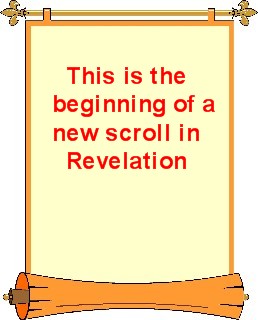Let us take a brief look at the secular history and city of Philadelphia
to the end of the first century A.D.-
The city of Philadelphia in Asia Minor was one of the seven cities of Revelation. It was located about 16 3/4 kilometers (27 miles) from Thyatira in a very beautiful valley that runs north and south in present day Turkey and was situated near the eastern base of Mount Tmolus. The city was built on 4 or 5 hills as a fortress city for defense. It was built in a favorable location being at the road junctions to Mysia, Phrygia, and Lydia and called the gateway to the East. The area had fertile soil and the Cogamis River, a tributary of the Hermus River. There were hot springs in the area heated by volcanic activity. The Lydian language was first spoken there but after the Greeks took over, the Greek language was spoken. The city's nickname was "Little Athens" due to it's predominant Greek culture. This city played a major part in spreading the Greek culture throughout the known world in its early days.
Philadelphia was founded about 140 B.C. by King Attalus II Philadelphus of Pergamos. There were two accounts of how this city got its name. Attalus II had a great love for his brother, Eumenes, who was the king of Pergamos. So, Attalus named the city, Philadelphia, that means the city of "brotherly love", due to the love he had for his brother. Another account was that the city was named Philadelphia after Attalus' last name because he was the founder of the city.
Some early politics of this city:
Attalus II Philadelphus, king of Pergamos, the founder of Philadelphia, was born in 220 B.C. and died in 138 B.C. He was the King of Pergamos from 159 B.C. until the time of his death. He was the second son of King Attalus I Soter and brother of Eumenes II, whom he succeeded. Before his accession he had been a loyal assistant to his brother, commanding local military forces that were fighting beside the Romans in campaigns in Galatia and Greece. He frequently went to Rome as an ambassador and earned a favorable reputation there. He maintained close relations with the Romans after becoming king. They helped him in his military struggle against Prusias II and helped him overthrow the Seleucid king Demetrius I. After Attalus' death, his entire kingdom came under the jurisdiction of the Romans which they named the province of Asia in 129 B.C.
The city was twice renamed in the past. It was named Neocaesarea after the Roman Emperor, Tiberius, in appreciation for his financial assistance in helping them rebuild the city after the major earthquake. Sometime later, it was renamed Flavia, after the Roman Emperor Vespasian's family name. This emperor reigned from 69 to 79 A.D. and started the ancient Roman imperial dynasty of Vespasian that was carried on by his sons Titus (who reigned from 79 to 81 A.D.) and Domitian (who reigned from 81 to 96 A.D.).
Early economics of this city:
Philadelphia was a wealthy city getting its money from trading and wine production. There was an amphitheater and many temples.
 Philadelphia was a religious city:
Philadelphia was a religious city:
There were temples to many gods, the main one being to Dionysos (Dionysus). This god was also called Bacchus, the goat god. Many believe this to be the first goat god (worshipped by ancient Satanists) that gave rise to the later goat-god, Baphomet (worshipped by many modern day Satanists). Many coins were minted in those early days with the head of Bacchus engraved on them. The city was nearly destroyed in 17 B.C. by a violent earthquake that shook down the pillars that held up some of the temples. The city received an imperial grant of money from Rome that was used to rebuild it.
In the first century, there were many house churches and the church had love, sound doctrine,
and a willingness to reach the lost for Christ. That is why it was called a missionary church
or true church to Christ. It had integrity and a love for the truth.
Pretenders were not tolerated there.
A Unique Way to Look At Each of the Scrolls of Revelation
This Revelation scroll is a unique work by God the Holy Spirit through His Apostle, John.
The information and messages in it and the scriptures it points to are for the spiritual benefit,
encouragement, guidance, and blessings of those Overcomers who study it. That is why it is
a blessing for each Overcomer who studies it (Revelation 1:3).
Each Revelation scroll was written separately and each one was delivered to the church(es)- one
at a time. If we consider each complete scroll to be a book then there are twelve independent
books placed together to make one complete book (Revelation 1:11). Each scroll must be evaluated
and studied
separately because each one contains spiritual insight(s) and messages necessary for our
spiritual growth and maturity. This is the way Revelation was written and how it is to be
studied. Jesus Christ is lifted up in each scroll showing that He is God and is the only way
to Heaven. Sometimes, God speaks truth in one scroll and then repeats this same truth in
another scroll or more. A good Teacher often repeats a truth so the hearers will understand it.
That is the way it is in the bible book of Revelation. If one truth is revealed in more than
one scroll, then I try to mention where it is listed in all of the relevant scrolls. And, sometimes,
if the same truth is also mentioned in other scrolls of the Bible, other than Revelation, I try
to mention it with its reference.
I can imagine that most Overcomers in the first century church waited expectantly
and patiently for the next edition (the next Revelation scroll) to be written and come to them.
The Apostle John was a senior citizen so it took some time for him to write each one, under
inspiration- so the receiving Overcomers had to be patient until the next one arrived- and I am
sure a lot of prayer went up for John on his behalf in this endeavor.
This Revelation scroll was not written in the western culture, rather, it was written in the
eastern culture in apocalyptic style. As such, the words and names in each verse may have
significant spiritual impact and meaning that are intended to draw the reader's attention
to other parts of the Word of God. Therefore, one purpose of this scroll is as an index to
some scriptures in other parts of God's inspired word. That is how I see it so I share in this
work some of those scriptures. That way I let God interpret the bible book of Revelation
as He sees fit. All I do is what the early church did with this scroll- to look into
the word of God to see what God has for each Overcomer.
All these things happened to them as examples- as object lessons to us- to warn us against
doing the same things- they were written down so that we could read about them and learn from
them in these last days as the world nears its end
(1 Corinthians 10:11 The Living Bible).
In each scroll of this bible book, I believe God can make relevant His word to each reader in
a personal way. Therefore, I try to let God interpret His own word- He does not need me to do
that for Him. That is why I try to limit any commentary of my own and why I try to limit
my own relevant ideas, nor use summaries or conclusions.
In the writing of this book I have used many resources.
Sometimes I referred to the original Greek language. Other times I have used a number of
paraphrased editions and translations. And, at other times, I have used my own paraphrase to
make things more easy to understand.
More light and truth is always
available to earnest seekers of God's word. As mentioned before, God promises a blessing to
those who study, believe, and apply all that is contained in the twelve scrolls of Revelation
(Revelation 1:3). |
Let Us Apply the Teachings in Revelation to Our Lives
Besides prophecy, and other things, the Bible book of Revelation is an index to other Biblical
scriptures. I challenge each of God's Overcomers to study the scriptures in this distinct
section diligently. What is God teaching His Overcomers through the study of these scriptures?
What all important truth does God want each of His Overcomers to know? Jesus said-
...you make search in the holy scriptures, in
the belief that through them you get eternal life- and it is those scriptures that give witness
about Me (John 5:39). So my question is
this- how can one apply what he has learned here to his life? And will one influence others
with these truths? |






